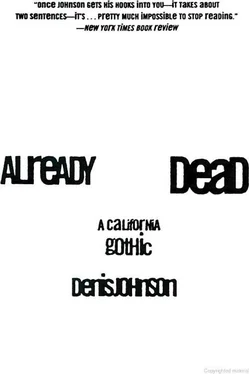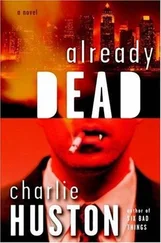Falls turned his palms over in the firelight and then back up so they cupped shadows, held up the night’s entire darkness, in fact, as he looked at his hands, a murderer’s hands.
Thompson got down in himself and stared at the flames. “About, what was it, maybe seventy-six cars wrecked at one time on Interstate Five, in the fog. A real bitch mother of a fog. It was one of those Sacra-mento-foothill things, not average like you get down around the ocean here. Fog thick enough you could fuck it. Tooley fog. I say just pull over and sleep till the sun burns it up the next day. I don’t know why people would drive in it. Seventy-six people looking for excitement.” Already Dead / 83
Van Ness felt no hesitation. But as it turned out, something forced him to put off his project with the psycho, Fairchild: Van Ness’s mother died.
The news didn’t hurt him. But it surprised him. He’d never heard a word from her doctors. A lawyer got him on the phone at his motel—“Is this Carl Van Ness, son of Elaine?”—and by that time she was already in the ground. The lawyer had contacted the folks at Van’s old boatyard in Seattle, with whom he’d left his address because he was owed commissions. “—son of Elaine?” He knew by those words alone that he was an orphan.
He was the only child, and had to go to Monterey County south of San Francisco to take care of her affairs. She’d left him her little house, but he had no use for it. He ended up spending nearly three weeks there.
Many afternoons he drove over to Salinas, in the Central Valley, to take in movies he didn’t really want to see: to sit for a while in front of out-of-focus scenes from lives that weren’t actual and then walk out into shopping centers surrounded by a vast agricultural enterprise.
Sometimes he followed Route 1 through Castroville, the Artichoke Center of the World, or drove around Monterey Bay to Santa Cruz 84
and took rides on various not too thrilling amusements along the boardwalk there. He had nothing to do with himself but these pointless things. His mother had perished of something he didn’t understand, something to do with electrolytes and the balance of hormones, anyway something that had shut her up for once, the poor, miserable woman, and he’d inherited some money, and the house in Carmel-by-the-Sea.
Carmel wasn’t his kind of place. The clouds moved too swiftly in off the Pacific and managed to look gray and crimson both at once. The fields to the east were burned blond and crested relentlessly by small sports cars. In the town itself he drifted alongside the shop windows, blown by a careless loneliness past arrays of gifts he’d never have wanted for himself. Subtle incense. Liniments — tennis, horses, all that.
He was better suited to the bay’s northern shore — seedy, sandy Santa Cruz. He liked eating out of the cheap beachside stands and trying his luck at the boardwalk games where surely they tried every way they possibly could to gyp him. He felt comfortable among the beatnik survivors and carnival types, people with self-created histories and fictitious names, tainted and used-up people. In septic barrooms he hung out drinking only black coffee and, when asked the reason, explained that he had pancreatic cancer. Or fatal hepatitis. Or things like Tangiers syndrome, which he made up. And when people offered sympathy he told them, “I could easily outlive you.”
He stood for hours at the shooting galleries, always his favorite thing, blasting away at ducks and jungle animals who lurched happily into his sights and disappeared and then turned up again, identically reincarnated. Now he saw why, as a boy, he’d felt called to such places. It amused him to identify these contraptions as important teachers and this completely mechanised region as the birthplace of his life’s philosophy: everything happens again and again…
At one point he joined a handful of tourists looking at least partly amused by a monkey dancing on a long chain. The animal wore the stock getup, the bellboy’s uniform minus the pants, performed somersaults absentmindedly, flipping himself as easily as the onlookers’ coins, which he gathered up with a brisk professional aloofness. When they weren’t tossed he approached people one at a time with his startlingly pale simian palm outstretched.
But the instant his gaze fell on Van Ness, the little acrobat charged at him viciously. Van had seen the surprising menace and then the Already Dead / 85
baffling rage pass over the monkey’s face, and was already backped-alling swiftly so that the beast, now nothing more than that, a wild, killing animal, savaged its own belly by running up against the end of its chain. Van walked away fast, shaking his head for the benefit of anybody looking at him — and they all were. A hundred feet from the scene he turned to see the monkey clinging to the side of a litter barrel, still staring at him, its mouth wide open, hissing from down in its throat.
With surprising strength it hoisted the large receptacle and banged it down on the ground over and over, never taking its eyes from Van’s face even across this distance. The crowd stayed back. The monkey’s master crept up on him cautiously, gathering up the chain hand over hand. He looked as confused as anybody there.
This run-in seemed just a silly part of his fate, a maverick detail in the general design. He’d ended one life a suicide and planned to spend the next a murderer, but things like this, stinging outbreaks, ambushes — he thought of the woman he’d picked up hitchhiking who’d nearly accused him of rape — things like this still had the power to hurt his feelings. And now he couldn’t believe it. He was weeping. He bent over and tried to make it look like a bout of coughing. An angry monkey, an angry monkey was making him cry. No, no — it was Elaine Van Ness, his mother. She’d lived alone, had raised herbs in her weedy garden, stolen books from the local library, collected miniature ceramic cats.
And now something had happened and all of that had stopped. Her loneliness, how had she borne it when he himself couldn’t stand even the thought of it? Her son…he hadn’t felt like her son since some time in childhood. Waiting for her to come home from work on schooldays, watching TV shows meant for younger children and eating the peanut butter and crackers she’d left out for him on a plate under a pastel paper napkin. They’d lived in an apartment near Baltimore, just the two of them. Later he’d taken to starting her car in the basement parking garage and driving it around down there. On the smooth concrete the tires squealed, even at a snail’s pace. Eventually he’d smashed one of the headlights against a concrete pillar. His mother had forgiven him. Today he’d have described himself as once again unsupervised and piloting a stolen machine. Quickly, with the heel of his hand, he erased the tears from his face, and then stood up straighter, clearing his throat several times.
86 / Denis Johnson
As he recovered from this inexplicable fit of mourning, he looked up and noticed a woman watching him. A small blonde by the entrance to the Haunted House. She’d just tossed a big head of cotton candy into the trash and now she wiped her hands on a napkin, holding them far out in front of her as if temporarily disowning them. She stared, and then turned away — it annoyed him to be a small panel in the tapestry, it annoyed him to be brief.
Van Ness was sure he recognized her. She passed under the boardwalk’s arch onto the sandy lane of shops and stalls, Pacific Street, and Van followed her for a while with a sense of how she brushed through the thickets of aromas and things like that coming out of other lives, sunlight banging down off a wall, cool dark hovering behind windows, the entangling essence of one person after another at the center of every little scene she passed. He could feel how she let them stroke her — he’d been doing it himself for days now around here. Irrelevant bastards.
Читать дальше












